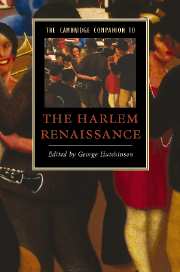Book contents
- Frontmatter
- Introduction
- Part I: Foundations of The Harlem Renaissance
- Part II: Major Authors and Texts
- 4 Negro drama and the Harlem Renaissance
- 5 Jean Toomer and the avant-garde
- 6 “To tell the truth about us”: the fictions and non-fictions of Jessie Fauset and Walter White
- 7 African American folk roots and Harlem Renaissance poetry
- 8 Lyric stars: Countee Cullen and Langston Hughes
- 9 “Perhaps Buddha is a woman”: women’s poetry in the Harlem Renaissance
- 10 Transgressive sexuality and the literature of the Harlem Renaissance
- 11 Sexual desire, modernity, and modernism in the fiction of Nella Larsen and Rudolph Fisher
- 12 Banjo meets the Dark Princess: Claude McKay, W. E. B. Du Bois, and the transnational novel of the Harlem Renaissance
- 13 The Caribbean voices of Claude McKay and Eric Walrond
- 14 George Schuyler and Wallace Thurman: two satirists of the Harlem Renaissance
- 15 Zora Neale Hurston, folk performance, and the “Margarine Negro”
- Part III: The Post-Renaissance
- Further Reading
- Index
6 - “To tell the truth about us”: the fictions and non-fictions of Jessie Fauset and Walter White
from Part II: - Major Authors and Texts
Published online by Cambridge University Press: 28 July 2007
- Frontmatter
- Introduction
- Part I: Foundations of The Harlem Renaissance
- Part II: Major Authors and Texts
- 4 Negro drama and the Harlem Renaissance
- 5 Jean Toomer and the avant-garde
- 6 “To tell the truth about us”: the fictions and non-fictions of Jessie Fauset and Walter White
- 7 African American folk roots and Harlem Renaissance poetry
- 8 Lyric stars: Countee Cullen and Langston Hughes
- 9 “Perhaps Buddha is a woman”: women’s poetry in the Harlem Renaissance
- 10 Transgressive sexuality and the literature of the Harlem Renaissance
- 11 Sexual desire, modernity, and modernism in the fiction of Nella Larsen and Rudolph Fisher
- 12 Banjo meets the Dark Princess: Claude McKay, W. E. B. Du Bois, and the transnational novel of the Harlem Renaissance
- 13 The Caribbean voices of Claude McKay and Eric Walrond
- 14 George Schuyler and Wallace Thurman: two satirists of the Harlem Renaissance
- 15 Zora Neale Hurston, folk performance, and the “Margarine Negro”
- Part III: The Post-Renaissance
- Further Reading
- Index
Summary
Jessie Fauset once told an interviewer that she, Walter White, and Nella Larsen became novelists after reading T. S. Stribling's Birthright, a novel that depicted the return of a newly minted black Harvard graduate to his southern hometown. His efforts at racial uplift flounder; his end is predictably tragic. Versions of this story had been told before, notably in Charles Chesnutt's novel The Marrow of Tradition and W. E. B. Du Bois' short story “Of the Coming of John” in The Souls of Black Folk, for example. But Stribling, a white author writing on the cusp of the Harlem Renaissance, found an unusually responsive audience. His black readers noted that response as well as the fallacies in Stribling's fiction, which suggested that the protagonist's tragedy is his black ancestry, while his ambitions derive from his “white blood.” Fauset and White knew better. Deigning to speak for her peers, Fauset reasoned: “here is an audience waiting to hear the truth about us. Let us, who are better qualified to represent that truth than any white writer, try to do so.” White responded similarly, when he observed that Stribling had written his story from the outside. When White's friend H. L. Mencken challenged him to write a better book, he began work on The Fire in the Flint. Like Birthright, it depicts a northern-trained black physician who brings his skills to uplift a rural southern community. Many of the novel's details are drawn from White's experiences as the assistant field secretary of the National Association for the Advancement of Colored People (NAACP). For Fauset and White, the commitment to a single verifiable truth both inspires and cripples their fiction. Their non-fiction, by contrast, remains powerful.
- Type
- Chapter
- Information
- The Cambridge Companion to the Harlem Renaissance , pp. 82 - 95Publisher: Cambridge University PressPrint publication year: 2007
- 1
- Cited by

